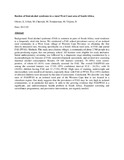| dc.description.abstract | Background. Fetal alcohol syndrome (FAS) is common in parts of South Africa; rural residence is a frequently cited risk factor. We conducted a FAS school prevalence survey of an isolated rural community in a West Coast village of Western Cape Province, so obtaining the first directly measured rate, focusing specifically on a South African rural area, of FAS and partial FAS (PFAS). Methods. The study area (Aurora village), a community of about 2 500 people in a grain-producing region, has one primary school. All learners were eligible for study inclusion. Initial anthropometry screening was followed by a diagnostic stage entailing examination by a dysmorphologist for features of FAS, neurodevelopmental assessment, and an interview assessing maternal alcohol consumption. Results. Of 160 learners screened, 78 (49%) were screen-positive, of whom 63 (81%) were clinically assessed for FAS. The overall FAS/PFAS rate among the screened learners was 17.5% (95% confidence interval 12.0 - 24.2%), with 16 (10.0%) children having FAS and 12 (7.5%) PFAS. High rates of stunting, underweight and microcephaly were noted in all learners, especially those with FAS or PFAS. Five (18%) mothers of affected children were deceased by the time of assessment. Conclusion. We describe very high rates of FAS/PFAS in an isolated rural part of the Western Cape that is not located in a viticultural region. Our study suggests that the prevalence of FAS may be very high in isolated communities, or in particular hot-spots. It adds to the growing evidence that FAS/PFAS is a significant, and underestimated, health problem in South Africa. Expanded screening and surveillance programmes, and preventive interventions, are urgently needed. | en |

